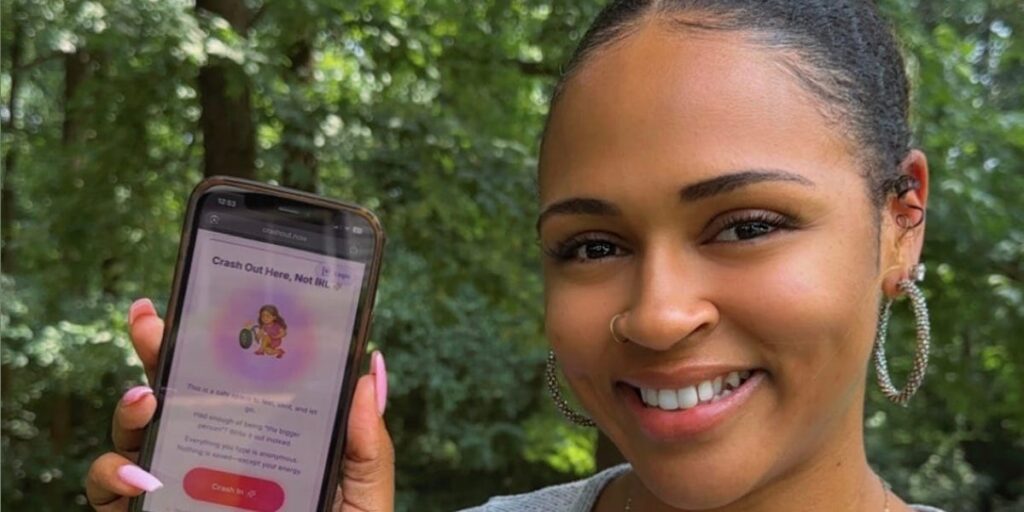When Karima Williams felt herself spiraling emotionally, she didn’t turn to friends or therapy. She tapped Claude, the AI chatbot made by Anthropic.
“I didn’t want to burden them,” the 34-year-old mom from Maryland told Business Insider about her loved ones.
What began as a personal tool to vent, think through decisions, and avoid snapping at her five-year-old son after a long workday soon became something bigger: Crash Out Diary, a web app for emotional offloading.
The account director at a marketing agency vibe-coded the app to help people regulate their emotions. The free app is anonymous and doesn’t save messages unless users create an account, Williams said.
Unlike typical chatbots, Crash Out Diary focuses on a single interaction. Users send one message, receive a short pep talk, and are guided to an activity — such as a tapping game or a breathing exercise — to help them feel more grounded.
Williams said “crashing out” is akin to emotionally unraveling: “You’re dealing with a lot of stuff at one time and you’re having an external reaction,” she said.
She posted a video about the web app on social media, where it hit 2 million views on Instagram. Since its April launch, the app has hosted about 50,000 “crash out sessions,” Williams said.
AI supports her in ways friends can’t
Williams first turned to Claude to help her process emotions she didn’t feel comfortable sharing. She was juggling work stress and anger at a former boss, so she built a private project in Claude using notes from her life coach.
She’d go to the AI and say, “Ok, how do we calm myself down?”
“I want to be regulated at work. I didn’t want to show up angry or mad,” she told Business Insider.
Claude’s tone was unexpectedly warm. “I felt seen by it,” she added.
What really helped her was the AI’s ability to organize her thinking.
“I was worried about a client issue, and I was like, I don’t know how I’m going to see through it,” she said. Claude talked me through it: “You got this. You just need to do X, Y, and Z — you already have it.”
That kind of clarity was something she didn’t always get from friends.
It can help “untangle your thought process,” she said. “That’s what friends can’t do for you, or you don’t want to put onto people.”
She also found comfort in AI’s on-demand nature. “There’s no inappropriate time to talk to it,” she said.
“Sometimes, I feel like I’m telling the same story over and over to my friends,” she said. “It’s not like my friends don’t want to be there. It’s just that sometimes I need a different perspective.”
AI has made her a more present mom
Williams said using AI has also made her a better parent.
It helps her not spiral into “I’m not a good mom” thoughts, she said. “It shows me the things that I do well about being a mom.”
After long workdays, Williams often feels drained — but her five-year-old still wants her full attention. Talking to AI became her reset button, helping her decompress before stepping into mom mode.
“I’m a better mom because I’m not so wound up and stressed, so I can really pay attention to my son,” she said.
Williams uses AI in everyday parenting. When she and her son found bugs in the house, they snapped photos, fed them into an AI tool, and identified them together. On nature walks, they use AI to figure out the names of plants and animals they spot.
“It helps me be more informative with him,” she said.
She asks AI to talk to her like she was 10
When Williams started building the web app, she didn’t know how to structure a product, let alone set up a backend.
Williams tells Claude to talk to her like she’s 10 or 15 years old, and it will walk her through what needs to be done.
“I also tell it to tell me one thing at a time, because it can be overwhelming,” she added.
The chatbot helped her write the product requirement documents, reviewed her code, and built her pitch deck.
Because Williams didn’t know engineering, “something that would take a software engineer a day may take me a week,” she said. “I’m learning at the same time as I’m building.”
“Sometimes that can be frustrating,” she said. “But it makes you patient.”
Williams said she’s now looking to grow Crash Out Diary. What started as a fun side project is evolving into something more — she’s adding new features based on user feedback and working to bring the app to Apple’s App Store.
There were also moments of unexpected humor along the way, as Claude mirrored her tone and personality.
“I can be dramatic,” she laughed. “Claude would be like, ‘Girl, are you serious right now?'”
She also found that speaking to AI worked better than typing. “It makes it 10,000 times easier for me to say what I need to say and then get the context out,” she said, adding that she dictates to AI about 90% of the time.
Williams said AI prompting should be a “household skill.”
She has found talking to AI useful for everything — not just building apps or making money. It helps you think better, plan better, even garden better, she added.
Do you have a story to share about vibe-coding? Contact this reporter at cmlee@businessinsider.com.
Read the full article here


